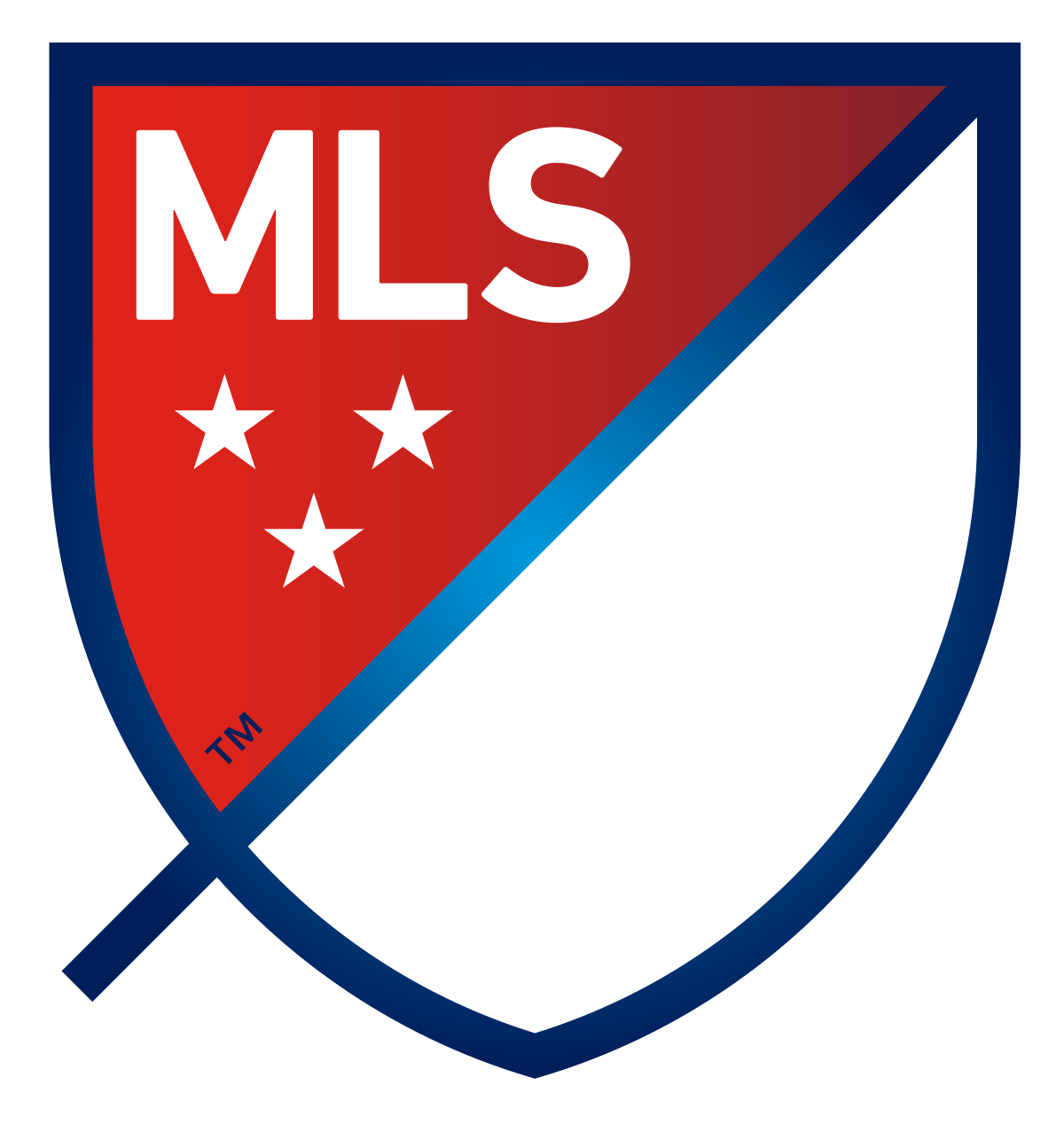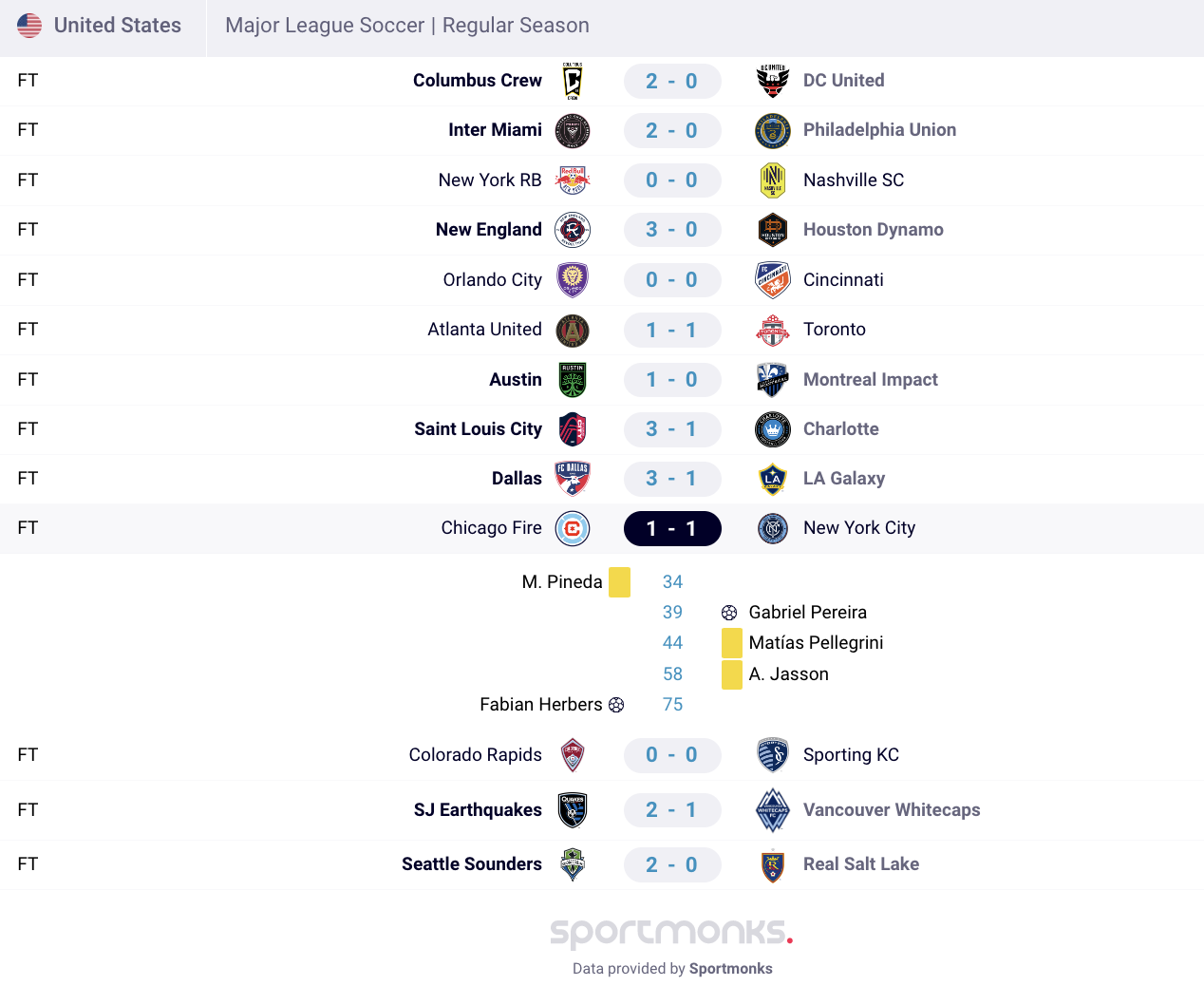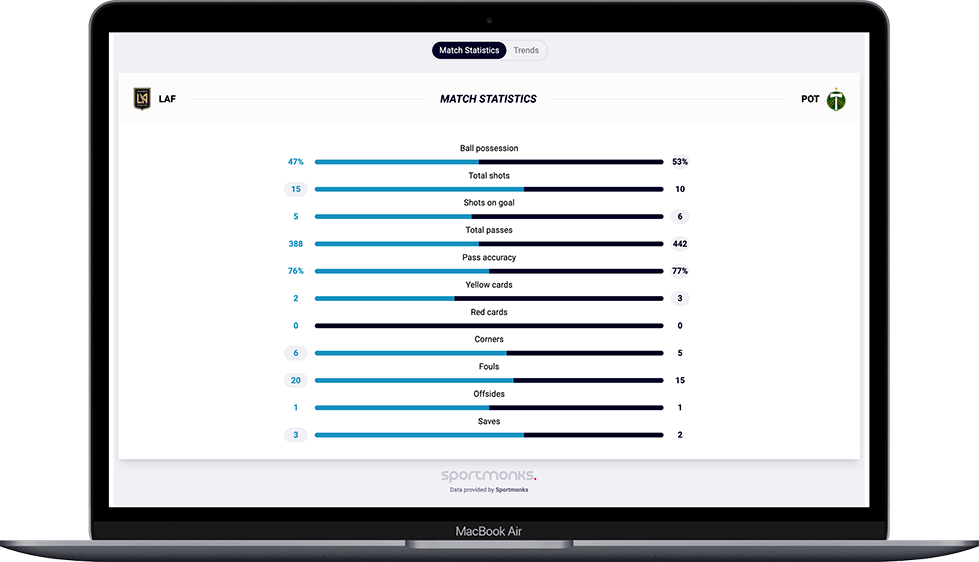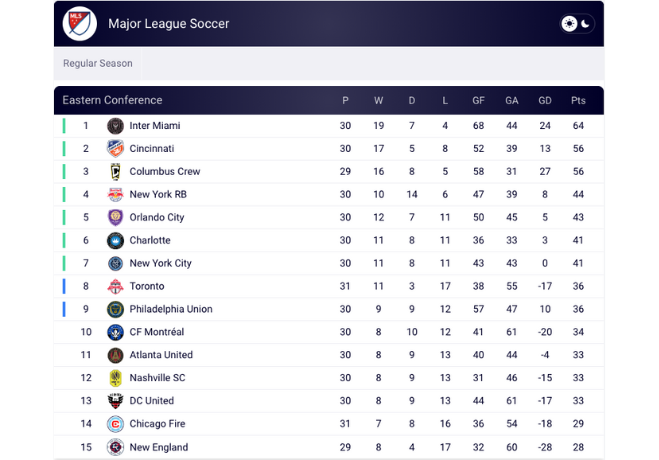Major League Soccer API Benefits and Perks
When it comes to sports data, we pride ourselves on offering a great product with competitive pricing and exemplary customer support. At Sportmonks, our APIs are fast, reliable and very high quality.
In today’s rapidly evolving sports industry, leveraging accurate and real-time data is crucial in creating engaging user experiences. Integrating a robust sports data API is essential whether you’re building a fantasy game, a live score app, a betting website, a sports app, or an analytical dashboard for soccer enthusiasts. This is particularly true when focusing on Major League Soccer (MLS), a league growing in popularity globally.
Access to Major League Soccer API allows you to tap into a wealth of statistics, performance metrics, player data, and real-time updates. From powering apps with live scores and player statistics to integrating betting platforms with accurate data, sports data APIs minimise the hassle of manual data collection and reduce the risk of inaccurate analysis. Automating these processes allows developers and businesses to focus on creating superior fan experiences without worrying about data accuracy and consistency.
However, many developers and small businesses still hesitate to implement data from an MLS API due to misconceptions about complexity, cost, and reliability. In this blog, we’ll explore the benefits and ease of using data from an MLS API, showcasing how it can transform your applications while minimising effort and enhancing user engagement.

Integrating the MLS API can be a game-changer for your sports-focused app or platform, helping you seamlessly access real-time, accurate data that enhances the overall user experience. With access to detailed information on thousands of matches, players, team statistics and other advanced MLS stats, the MLS API allows your app to deliver in-depth insights into every facet of the American soccer league. This includes complete team squads, real-time scores, match scores and match statistics, essential for building engaging solutions like fantasy sports platforms, sports apps and betting apps. By incorporating this API, your app will stand out in the competitive sports market, providing users with timely updates on scores, transfers, and injury reports—delivered in real-time.
While some developers worry that API integration may seem too complex or costly, our MLS API addresses these concerns by streamlining data access, reducing manual data collection, and minimising the risk of human error. Automating your data feeds saves time and ensures consistency, which is crucial for fantasy sports and betting websites that require precise and reliable data to function optimally. Although manual data collection is often seen as customisable, it’s prone to error and inefficiency, making the automated approach far more valuable.
Many fear the risks involved with third-party APIs, such as data breaches, implementation struggles, or downtime, but the MLS API is designed with reliability in mind. Its robust infrastructure minimises downtime, and advanced security protocols ensure your data remains safe. Though some may assume APIs are only suitable for expert developers or large-scale businesses, the MLS API is flexible enough to accommodate small projects, offering high ROI even for personal or smaller-scale platforms. Additionally, the API’s affordability and wide-ranging data coverage make it an accessible option that can cater to general and niche data needs, ensuring your app remains relevant and up-to-date.


When it comes to sports data, we pride ourselves on offering a great product with competitive pricing and exemplary customer support. At Sportmonks, our APIs are fast, reliable and very high quality.

One of the MLS API’s major selling points is its ability to deliver accurate, up-to-the-minute data. Whether it’s match results, player stats, or league standings, having the most current information is critical for apps that aim to keep users informed and engaged.
Popular MLS teams like Inter Miami, NY Red Bulls, LA Galaxy and Columbus Crew are covered extensively. This means you can track real-time performances, transfers, and injury reports for teams with global fanbases.
Thanks to high data refresh rates, you can rest assured that your app will display up-to-date data without lag. The API is built for performance, allowing users to interact with live statistics, standings, and even odds with minimal latency. This is especially important for sports betting apps and other real-time platforms, where delays can result in a poor user experience.
If you’re ready to explore how to integrate this data into your project, check out our API Integration Guide.
For those looking to dive deeper into analytics, the MLS API offers advanced statistics that provide in-depth insights into player and team performances. Here are some examples of the type of advanced stats available:
1. Expected goals (xG): A crucial metric for assessing the quality of scoring chances.
2. Passing accuracy: Measure how efficiently a player or team moves the ball.
3. Fixture probabilities: Get the probabilities for every fixture.
4. Team’s standings: Show the team’s standings for the current and historical seasons.
5. Shot conversion rates: A detailed breakdown of players’ ability to turn chances into goals.
These metrics are highly valuable for developers looking to build analytical tools, fantasy sports platforms, or sports betting apps that go beyond the surface level of match results and basic player statistics.

When it comes to flexibility, the MLS API stands out by allowing you to tailor the data feeds to fit the exact needs of your business. Whether you’re building a betting app, a sports app, a live scores platform, or a comprehensive sports analytics tool, this API has you covered. You can customise data feeds to focus on specific elements, such as filtering by clubs, players, match statistics, or any other criteria relevant to your project. This flexibility ensures you’re not overwhelmed by unnecessary information and can focus on what matters most to your audience.
For instance, if you’re developing an app tracking live match events, you can select only the livescores, fixtures, and statistics endpoints to streamline your data. If your platform caters to in-depth soccer analytics, you can include expected goals (xG), team squads, and top scorers. You even have the option to filter by seasons, teams, and rounds, ensuring the data you receive aligns with your project requirements.
If betting is your focus, the Standard Odds Feed and Premium Odds Feed endpoints provide live match odds and bookmaker data. For those focusing on team management and player performance, data on transfers, coaches, referees, and even rivals can be easily integrated. This granular control makes the MLS API an invaluable tool for businesses looking to deliver a tailored experience without unnecessary clutter.
Ready to customise your data feeds? Check out our API documentation for a detailed guide on how to get started.
{
"data": [
{
"id": 1527428,
"season_id": 19686,
"player_id": 83665,
"type_id": 208,
"position": 1,
"total": 12,
"participant_id": 2905,
"player": {
"id": 83665,
"sport_id": 1,
"country_id": 320,
"nationality_id": 320,
"city_id": null,
"position_id": 27,
"detailed_position_id": 151,
"type_id": 27,
"common_name": "P. Mortensen",
"firstname": "Patrick",
"lastname": "Mortensen",
"name": "Patrick Mortensen",
"display_name": "Patrick Mortensen",
"image_path": "https://cdn.sportmonks.com/images/soccer/players/17/83665.png",
"height": 188,
"weight": 81,
"date_of_birth": "1989-07-13",
"gender": "male"
}
},
{
"id": 1527426,
"season_id": 19686,
"player_id": 37555815,
"type_id": 208,
"position": 2,
"total": 10,
"participant_id": 2394,
"player": {
"id": 37555815,
"sport_id": 1,
"country_id": 1578,
"nationality_id": 1578,
"city_id": null,
"position_id": 26,
"detailed_position_id": null,
"type_id": 26,
"common_name": "A. Schjelderup",
"firstname": "Andreas",
"lastname": "Schjelderup",
"name": "Andreas Schjelderup",
"display_name": "Andreas Schjelderup",
"image_path": "https://cdn.sportmonks.com/images/soccer/players/7/37555815.png",
"height": 176,
"weight": null,
"date_of_birth": "2004-06-01",
"gender": "male"
}
},
{
"id": 1527429,
"season_id": 19686,
"player_id": 172250,
"type_id": 208,
"position": 3,
"total": 9,
"participant_id": 85,
"player": {
"id": 172250,
"sport_id": 1,
"country_id": 47,
"nationality_id": 47,
"city_id": null,
"position_id": 27,
"detailed_position_id": 152,
"type_id": 26,
"common_name": "V. Claesson",
"firstname": "Viktor",
"lastname": "Claesson",
"name": "Viktor Claesson",
"display_name": "Viktor Claesson",
"image_path": "https://cdn.sportmonks.com/images/soccer/players/26/172250.png",
"height": 183,
"weight": 75,
"date_of_birth": "1992-01-02",
"gender": "male"
}
},
//And more

Our Major League Soccer standings widget is built entirely for the best view of the current standings, offering real-time standings updates for teams across the league. Whether your users track their favourite club’s progress or check playoff positions, the standings are automatically refreshed after every match, ensuring your platform is always up-to-date.
Our MLS API does not only have real-time football match results and real-time MLS data but also historical data.
To get started with the standings widget, head over to our API instructions, where you’ll find step-by-step guidance on integration. Want to track a star player’s performance instead? Explore Lionel Messi’s current season stats here for a deeper dive into his impact on the MLS.

Experience a stress-free app development journey with Sportmonks‘ user-friendly platform and exceptional customer support. Say goodbye to expensive or incorrect data and start your free trial now.
Any data you want to use is available to you thanks to our flexible MLS API. Our MLS API can assist you in achieving your objectives whether you’re creating your own live score or betting app. Tell us about your goals, and we’ll provide you with specialised advice so you can choose the data that will best serve your needs. Choose the plan that best meets your demands by taking into account our data features.
The MLS comprises 28 teams, 25 in the US and 3 in Canada. The league has a fixed membership like most sports leagues in the US and Canada, making it one of the few soccer leagues that do not use a promotion and relegation process. Instead of operating as an association of independently owned clubs, MLS is a single entity in which each team is owned by the league.
The MLS regular season usually starts in late February and runs through mid-October, with each team playing 34 games. After the regular season, the team with the best record is awarded the Supporters’ Shield. Following the regular season is a postseason knockout tournament to determine the league champion. Fourteen teams participate in the MLS Cup play-offs. All rounds in the postseason are single-match eliminations hosted by the higher seed. The conference Semifinals and Conference Finals are played in a home-and-away format.
Atlanta United FC was founded in 2017 as an MLS expansion team. It is the first MLS franchise to be based in Atlanta. They have set several league records for highest single-match and average attendance.
Charlotte Football Club was founded in 2019 as an expansion and is the MLS’ 28th franchise. The team holds the MLS record for standalone match attendance, with 74,479 spectators present at their inaugural home match.
Chicago Fire Football Club was founded in 1997 as one of the league’s first expansion teams. They won the MLS Cup and the US Open Cup in their first season in 1998. The club won the first-ever MLS Wooden Spoon, handed out to the worst team in a specific season.
FC Cincinnati was founded in 2018. The team succeeded the lower-division team of the same name. They played their first match in 2019 against Seattle Sounder FC.
Columbus Crew was founded in 1994. They are one of the 10 charter clubs of the league. The Crew have won six major trophies, the MLS Cup twice, the Supporters’ Shield three times and one US Open Cup.
D.C. United was founded in 1994 as one of the charter clubs of the league. The club won the 1998 CONCACAF Champions’ Cup making them one of only two MLS teams to ever win that tournament.
Inter Miami was founded in 2018 and played for the first time in the 2020 season. The team is owned by famous English footballer David Beckham. They were able to sign Lionel Messi, Jordi Alba and Sergio Busquets in 2023.
CF Montréal was founded in 2010 and is one of 3 Canadian teams in the MLS. The club rebranded in 2021 to CF Montréal with its former name being Montréal Impact.
New England Revolution was founded in 1996 and has competed in the league since its inaugural season. The Revolution is the only original MLS team to have televised every league game in their history.
New York City FC was founded in 2013 and are often referred to as NYCFC. The club is co-owned by City Football Group, which also owns Manchester City. New York City FC played its first game in 2015, as the 20t overall expansion team of the league.
New York Red Bulls was founded in 1996 as the New York/New Jersey MetroStars. In 2006 the team was sold to Red Bull and re-branded as part of the company’s global network of soccer clubs.
Orlando City was founded in 2013 and began to play in 2015 as the 21st franchise in MLS. In doing so they became the first MLS team in Flordia since Miami Fusion and Tampa Bay Mutiny.
Philadelphia Union was founded in 2008 and began playing in 2010 as an expansion team. Professional basketball player Kevin Durant serves as a minority owner. In 2020, Philadelphia secured the Supporters’ Shield, winning the first title in the club’s history.
Toronto FC was founded in 2005 and was the first Canadian-based franchise in the league. In 2017, Toronto won the domestic treble with the MLS Cup, Supporters’ Shield and Canadian Championship.
Austin FC was founded in 2018 and played its first game in the 2021 season. They are the first major professional sports league team to play in Texas’ capital. Their home stadium is Q2 stadium in Austin.
Colorado Rapids was founded in 1995 and is a founding member of the MLS. The Rapids are owned by the Kroenke family. The family also owns the Denver Nuggets and the famous football club Arsenal which plays in the Premier League.
FC Dallas was founded in 1995 as the Dallas Burn before adopting its current name in 2004. Their academy and reserves are regarded as one of the best in the MLS, producing players that have gone and played abroad including in renowned leagues in Europe.
Houston Dynamo FC was founded in 2005 after the relocation of the San Jose Earthquakes to Houston following the 2005 season. They have been MLS Cup champions twice winning both in their first two seasons in Houston.
Sporting Kansas City was founded in 1995 as Kansas City Wiz. The team rebranded in November 2010, coinciding with its move to its home stadium, now known as Children’s Mercy Park.
LA Galaxy was founded in 1994 and is one of the founding members of the MLS. The franchise is one of the MLS’ most successful teams, with a record five MLS Cups and four additional appearances in the final.
Los Angeles FC was founded in 2014 and began playing during the 2018 season. During their second season. LAFC won the Supporters’ Shield with club captain Carlos Vela earning the MVP award.
Minnesota United FC was founded in 2015 and began to play in 2017 replacing the North American Soccer League franchise of the same name. They are nicknamed The Loons.
Nashville SC was founded in 2017 and played in the league from the 2020 season. They play their home matches at Geodis Park.
Portland Timbers was founded in 2009 and played their first match in 2011 at Providence Park. In 2015 the franchise won its first major, the MLS Cup, becoming the first team in Cascadia to do so.
Real Salt Lake often shortened to RSL was founded in 2004. They won the MLS Cup for the first time in 2009.
San Jose Earthquakes was founded in 1994 as the San Jose Clash. The organization relocated to Houston in 2005 following failing efforts to secure a stadium in San Jose. They returned after a two-year hiatus, resuming play in 2008.
Seattle Sounders FC was founded in 2007. They played their inaugural match in 2009, winning 3-0 over the New York Red Bulls. Seattle has been among the MLS’ most successful teams.
Vancouver Whitecaps FC was founded in 2009 and began to play in 2011 as the 17th team to enter the MLS. In the 2012 season, the team became the first Canadian team to qualify for the MLS Cup play-offs.